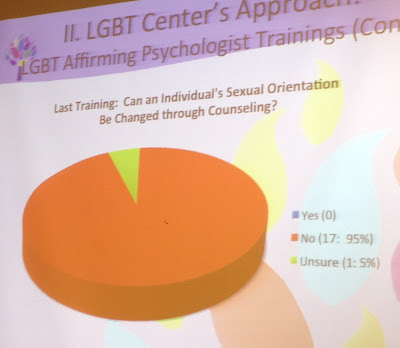CHINA: NGO Outreach to the Mental Health Community - Challenges and Opportunities in Increasing Standards for Mental Health Care
The workshop started with the presentation on mental health situation of LGBT community in China. First came the brief history and milestones of China's LGB mental health situation, then it went on discussing about lingering discrimination. One evidence of discrimantion is shown in the wording of the CCMD-3 (Chinese classification of mental disorders, 2001) which says "same-sex sexual attraction itself is not necessarily abnormal". Compared to WHO's ISO-10 (1992) which states "sexual orientation itself cannot be regarded as a disorder", the wording in CCMD-3 has become weaker. The talk continued with two major issues in psychological counseling that China is facing, one is certification process through Ministry of Labor for psychologists and psychiatrists, another is oversight and supervision. The training process for psychologists in China is described as lack of sensibility for LGBT, lack of supervision of exterior trainings, and lack of practical, systematic and applied knowledge in trainings. Family pressure is also listed as one discrimination's evidence.
The presentation on China's LGBT mental health ended with sharing experience of how to resolve the existing problems in the trainings for psychologists and psychiatrists. One interesting note I withdrew from the cases: In an LGBT affirming psychologist training, they asked the same question before and after conducting the training, "Can an individual's sexual orientation be changed through counseling?". And here, you may take a look at how the percentage of answers have changed:
 |
| Before |
 |
| After |
The Mental Health Sector: Adversary or Ally of LGBTIQ people in Asia?
The second half of the workshop surrounded the more generic topic "The Mental Health Sector: Adversary or Ally of LGBTIQ people in Asia?". It raised up the question that why LGBTIQ advocates should be interested in the mental health sector. One noticeable reply is that LGBTIQ people receive worse services in mental health care than other people in the society because there are not enough trained psychologists. Most of the psychologists and psychiatrists for LGBTIQ people don't really understand their clients.
To obtain more thorough understandings about mental health situation of LGBTIQ communities in Asia countries, the attendees were divided into groups discussing about the current circumstances in their home countries regarding the following questions:
1- What (if anything) do psychologists and psychiatrists do that is harmful to LGBTIQ people?
2- What (if anything) do psychologists and psychiatrists do that is helpful to LGBTIQ people?
3- What kind of services can LGBTIQ people expect if they go see a psychologist or psychiatrist? Bias? Understanding?
4- Are there any recent changes?
5- Are LGBTIQ activists doing anything to change psychologists and psychiatrists' (or the state's) views and practices? If yes, what?
The group discussions have gathered many local stories, insights, obstacles, challenges from the Philippines, Lebanon, Palestine, Mongolia, Indonesia, Vietnam, and Singapore. Most agreed that for mental health care, LGBTIQ people should come seeking advice and help from people who understand them. However it then came back to the issue in China: there are not enough trained psychologists and psychiatrists.
The sharing from the situation in Thailand revealed that most people think homosexuality is not an illness, however most still have limited understanding and many misunderstandings. People accept LGBTIQ but don't understand and don't seem to make any effort to understand.
The workshop ended with the inspiring question "how do you convince LGBTIQ people to go to psychologists or psychiatrists for mental health problems?".
Lana Tran

Great job bloggers!!!
ReplyDelete